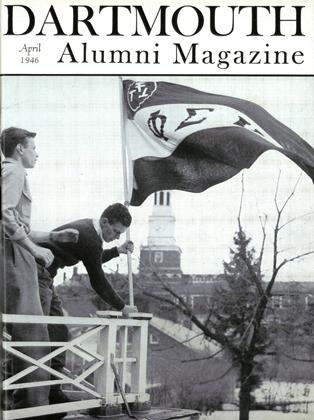SINCE the end of the war college publicity officers throughout the country have been busily releasing announcements of new curricula, revised curricula, and special study programs in their respective institutions. The plans now made public are the fruits of painstaking study over periods of as much as three and four years, during which time the colleges and universities in the United States have been greatly exercised over the form and objectives of "the postwar curriculum."
Academic shortcomings brought to light during the war years have resulted, in general, in greater prescription in the freshman a:nd sophomore years." Thanks partly to nomenclature fostered by Harvard's widely publicized General Education in aFree Society, one now speaks in terms of general education, or distributive requirements aimed at breadth of knowledge, versus "free" education, or unrestricted electives to satisfy the specialized interests and needs of the individual student; and the warring groups are drawn up essentially along those lines. From Dartmouth's point of view, it is especially interesting that in some cases the effort to combine the advantages of the two has resulted in a "new" curriculum closely resembling the traditional purposes of this College and the educational plan followed in Hanover since the 2o's. In its own studies, Dartmouth's Committee on Educational Policy found that in basic outline the present Dartmouth curriculum still measures up to the needs of the broadly educated man in today's complex world, albeit in details there is considerable room for improvement.
Another general development, and an important and encouraging one, is the apparently greater willingness of the colleges to face up to their responsibility in the practical realms of national and world citizenship. When educators first tackled the question of "the postwar curriculum" it is highly doubtful that any one of them ever envisaged either the problems of the Atomic Age or the urgency with which they must now be solved. Some of the curriculum studies have been long on statement and analysis of this responsibility but disappointingly short on any concrete proposals \to meet it. It is not everyone's opinion that Dartmouth's newly revised curriculum has sufficiently shaken off the shackles of rooted thinking—readily admitted by the Committee on Educational Policy, which was forced to compromisebut Dartmouth men can take satisfaction in the thinking and the sense of civic responsibility embodied in the course in Great Issues of the Modern World which all Dartmouth seniors will be required to take. It is no secret that President Dickey proposed this course to the curriculum committee and with their enthusiastic endorsement told its aims to the general faculty at the first of the two special meetings which were held to enact the committee's proposals into degree requirements. If the course succeeds in its purposes, it will tie together knowledge acquired in the first three years of college and focus it upon the great national and international problems of the day; it will give to seniors, just before they assume the duties of citizenship, some grasp of those issues upon which they must take their individual stands; and it will have the advantage, now lacking in the College, of giving to the senior class as a whole a common educational experience and a common sense of purpose.
It seems all to the good, in these days especially, to bear down heavily on the ideas of purpose and responsibility—for the colleges themselves and for the students in them. The needs of human society have become so vast, and in a sense so frightening, that our colleges and universities can no longer afford to be vague about what they are trying to do, and our students, and graduates, can no longer look upon a college education as anything but a responsibility "to do something," as President Dickey puts it, "about those things which need doing."
There is evidence in the newly revised curriculum that Dartmouth College and Dartmouth men are aware o£ what needs to be done and are taking up the challenge.
STUDENTS LEAVING WEBSTER HALL AFTER CONVOCATION EXERCISES ON MARCH 11
 View Full Issue
View Full Issue
More From This Issue
-
 Class Notes
Class Notes1918
April 1946 By ERNEST H. EARLEY, DONALD L. BARR -
 Article
ArticleLabor Marches With the Times
April 1946 By MALCOLM KEIR, -
 Article
ArticleTHE NEW CURRICULUM
April 1946 By PROF. HUGH S. MORRISON '26, -
 Class Notes
Class Notes1917
April 1946 By MOTT D. BROWN, DONALD BROOKS -
 Class Notes
Class Notes1911
April 1946 By NATHANIEL G. BURLEIGH, EDWIN R. KEELER -
 Article
ArticleEducational Aims
April 1946 By PROF. CHARLES LEONARD STONE '17







